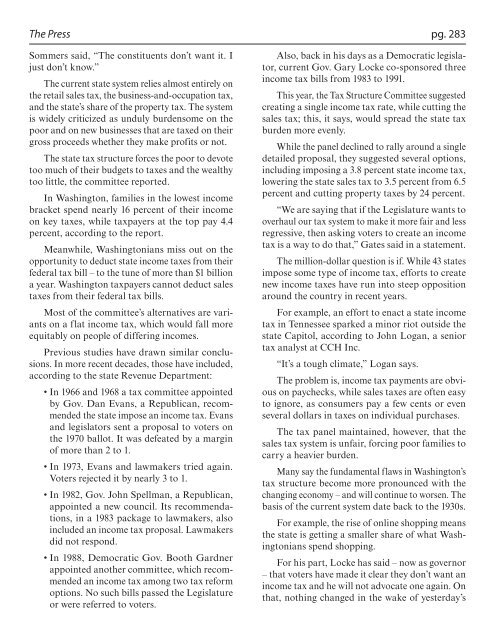Helen Sommers: An Oral History
Helen Sommers: An Oral History
Helen Sommers: An Oral History
You also want an ePaper? Increase the reach of your titles
YUMPU automatically turns print PDFs into web optimized ePapers that Google loves.
The Press<br />
<strong>Sommers</strong> said, “The constituents don’t want it. I<br />
just don’t know.”<br />
The current state system relies almost entirely on<br />
the retail sales tax, the business-and-occupation tax,<br />
and the state’s share of the property tax. The system<br />
is widely criticized as unduly burdensome on the<br />
poor and on new businesses that are taxed on their<br />
gross proceeds whether they make profits or not.<br />
The state tax structure forces the poor to devote<br />
too much of their budgets to taxes and the wealthy<br />
too little, the committee reported.<br />
In Washington, families in the lowest income<br />
bracket spend nearly 16 percent of their income<br />
on key taxes, while taxpayers at the top pay 4.4<br />
percent, according to the report.<br />
Meanwhile, Washingtonians miss out on the<br />
opportunity to deduct state income taxes from their<br />
federal tax bill – to the tune of more than $1 billion<br />
a year. Washington taxpayers cannot deduct sales<br />
taxes from their federal tax bills.<br />
Most of the committee’s alternatives are variants<br />
on a flat income tax, which would fall more<br />
equitably on people of differing incomes.<br />
Previous studies have drawn similar conclusions.<br />
In more recent decades, those have included,<br />
according to the state Revenue Department:<br />
• In 1966 and 1968 a tax committee appointed<br />
by Gov. Dan Evans, a Republican, recommended<br />
the state impose an income tax. Evans<br />
and legislators sent a proposal to voters on<br />
the 1970 ballot. It was defeated by a margin<br />
of more than 2 to 1.<br />
• In 1973, Evans and lawmakers tried again.<br />
Voters rejected it by nearly 3 to 1.<br />
• In 1982, Gov. John Spellman, a Republican,<br />
appointed a new council. Its recommendations,<br />
in a 1983 package to lawmakers, also<br />
included an income tax proposal. Lawmakers<br />
did not respond.<br />
• In 1988, Democratic Gov. Booth Gardner<br />
appointed another committee, which recommended<br />
an income tax among two tax reform<br />
options. No such bills passed the Legislature<br />
or were referred to voters.<br />
pg. 283<br />
Also, back in his days as a Democratic legislator,<br />
current Gov. Gary Locke co-sponsored three<br />
income tax bills from 1983 to 1991.<br />
This year, the Tax Structure Committee suggested<br />
creating a single income tax rate, while cutting the<br />
sales tax; this, it says, would spread the state tax<br />
burden more evenly.<br />
While the panel declined to rally around a single<br />
detailed proposal, they suggested several options,<br />
including imposing a 3.8 percent state income tax,<br />
lowering the state sales tax to 3.5 percent from 6.5<br />
percent and cutting property taxes by 24 percent.<br />
“We are saying that if the Legislature wants to<br />
overhaul our tax system to make it more fair and less<br />
regressive, then asking voters to create an income<br />
tax is a way to do that,” Gates said in a statement.<br />
The million-dollar question is if. While 43 states<br />
impose some type of income tax, efforts to create<br />
new income taxes have run into steep opposition<br />
around the country in recent years.<br />
For example, an effort to enact a state income<br />
tax in Tennessee sparked a minor riot outside the<br />
state Capitol, according to John Logan, a senior<br />
tax analyst at CCH Inc.<br />
“It’s a tough climate,” Logan says.<br />
The problem is, income tax payments are obvious<br />
on paychecks, while sales taxes are often easy<br />
to ignore, as consumers pay a few cents or even<br />
several dollars in taxes on individual purchases.<br />
The tax panel maintained, however, that the<br />
sales tax system is unfair, forcing poor families to<br />
carry a heavier burden.<br />
Many say the fundamental flaws in Washington’s<br />
tax structure become more pronounced with the<br />
changing economy – and will continue to worsen. The<br />
basis of the current system date back to the 1930s.<br />
For example, the rise of online shopping means<br />
the state is getting a smaller share of what Washingtonians<br />
spend shopping.<br />
For his part, Locke has said – now as governor<br />
– that voters have made it clear they don’t want an<br />
income tax and he will not advocate one again. On<br />
that, nothing changed in the wake of yesterday’s
















